Key takeaways:
- Responsible breeding prioritizes animal health, temperament, and genetic diversity to ensure well-adjusted and healthy offspring.
- Ethical considerations in breeding involve long-term commitments to the animals and their future owners, emphasizing transparency and education.
- Community involvement enhances awareness and accountability in breeding practices, fostering a network dedicated to the well-being of pets and advocacy for responsible ownership.
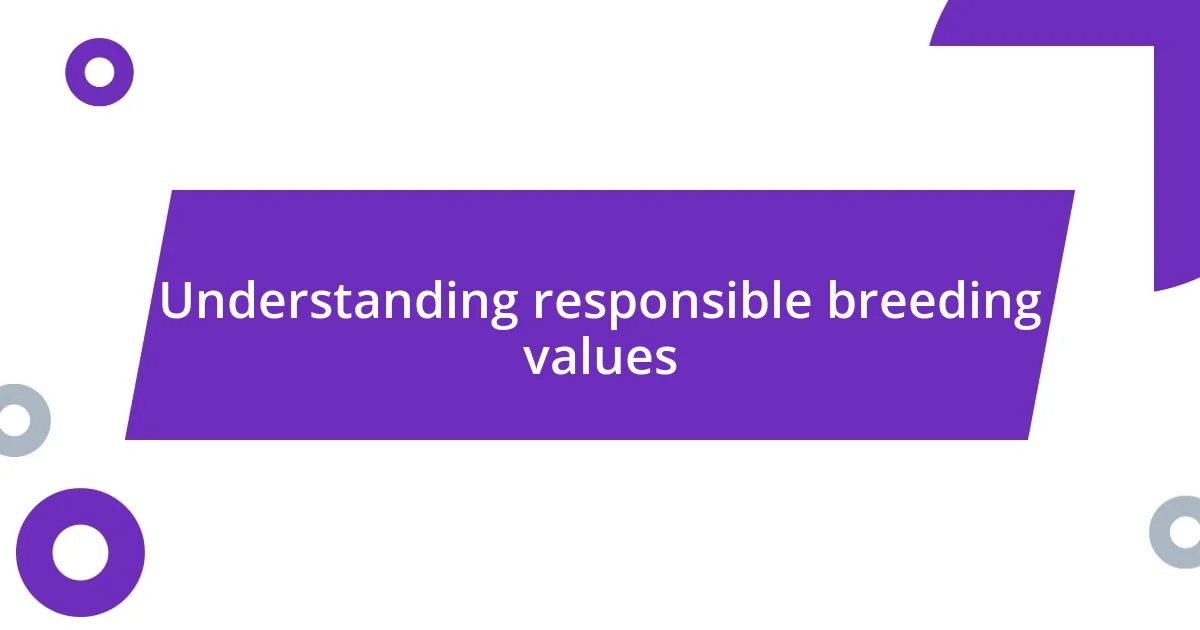
Understanding responsible breeding values
When I think about responsible breeding values, I often reflect on the importance of health and temperament in the animals being bred. I remember meeting a breeder who emphasized that selecting for not just physical traits, but also for good temperament, made all the difference. Have you ever noticed the joy a well-socialized animal brings? That’s what responsible breeding can achieve.
One aspect that stands out to me is genetic diversity. I’ve seen cases where breeders focused too narrowly on certain desirable traits, leading to health issues in the lineage. It’s an emotional journey to witness these animals struggle; it really drives home the fact that a responsible approach means prioritizing the overall well-being of the breed, not just aesthetic appeal.
Education plays a crucial role, too. I recall participating in workshops that highlighted the importance of responsible practices—things like proper health testing and understanding breed-specific challenges. It made me realize that breeding is not just a business but a commitment to producing healthy, resilient animals. Isn’t it inspiring to think that our choices can lead to generations of happier, healthier pets?
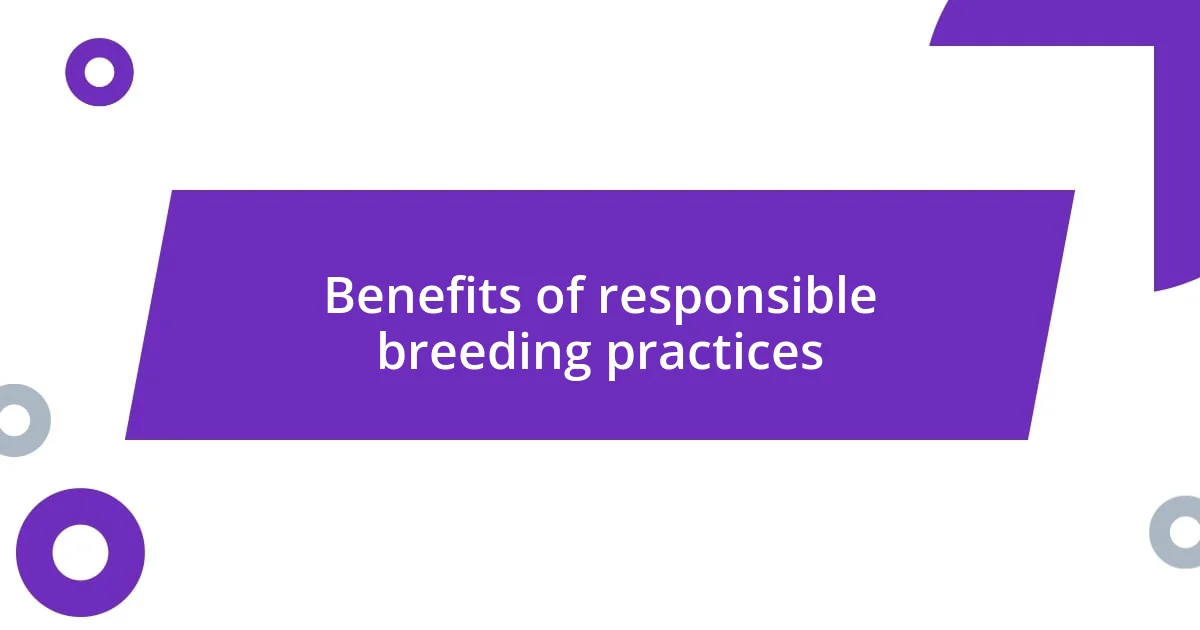
Benefits of responsible breeding practices
Responsible breeding practices offer a multitude of benefits that extend well beyond the immediate goals of creating a litter. For me, it’s deeply reassuring to see how these practices contribute to the overall health and vitality of a breed. I’ve experienced the joy of watching puppies flourish when they come from a responsible breeder who prioritizes health screenings and temperament testing. It’s not just about bringing new life into the world; it’s about ensuring that each puppy has the best foundation to thrive.
Here are some notable benefits of responsible breeding practices:
- Improved Health: By focusing on health testing, breeders can significantly reduce the risk of hereditary diseases.
- Better Temperament: Breeding for temperament leads to well-adjusted animals that are easier to train and integrate into homes.
- Genetic Diversity: Responsible breeders often prioritize genetic diversity, fostering stronger immune systems and reducing the incidence of breed-specific health problems.
- Enhanced Lifespan: Healthier breeding practices can lead to longer, happier lives for pets, which ultimately strengthens the human-animal bond.
- Community Education: Responsible breeders also contribute to education, helping prospective pet owners understand the commitment and care that comes with responsible pet ownership.
Witnessing these benefits firsthand, I can’t help but feel optimistic about the future of breeding. Each responsible choice reverberates through generations, shaping not just the animals but the families and communities that welcome them home.
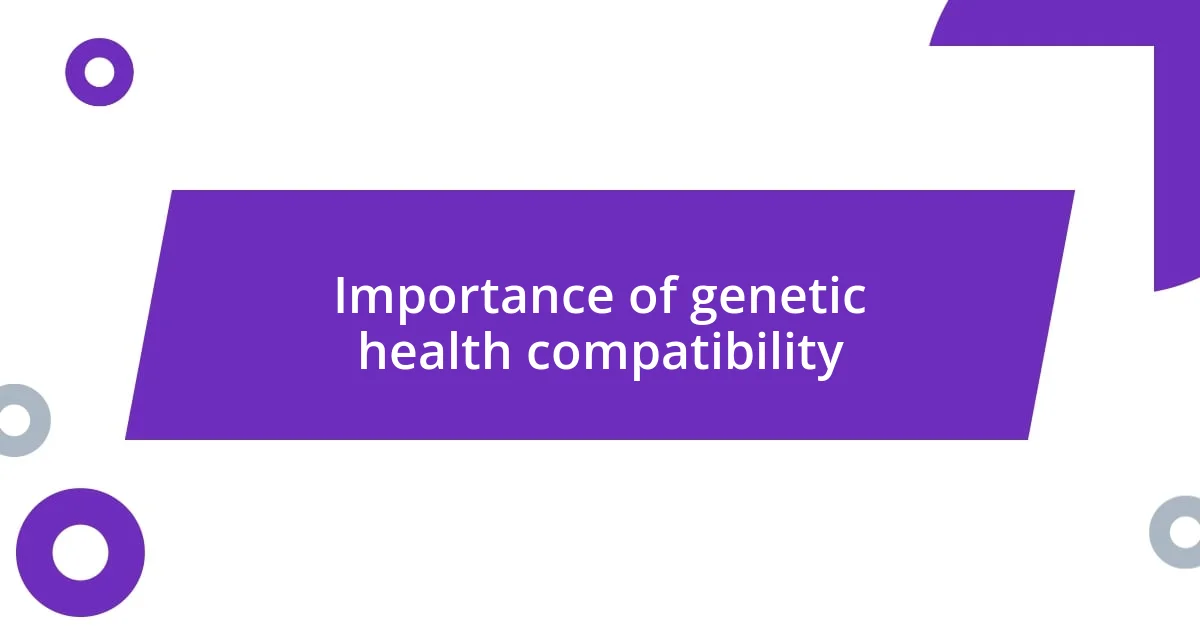
Importance of genetic health compatibility
Genetic health compatibility is a crucial aspect of responsible breeding that resonates deeply with me. It’s not just about picking two animals that look great together but ensuring their genetic profiles work harmoniously. I remember when a friend in the breeding community shared how she carefully chose a stud dog based on health screenings. The result? A litter of puppies that thrived without the common genetic issues seen in that breed. It’s stories like these that make me appreciate the impact of informed breeding decisions.
Often, I think about the emotional toll associated with breeding practices that ignore genetic compatibility. I’ve seen breeders who, despite their best intentions, ended up with puppies that faced health challenges due to poor genetic matches. It was heart-wrenching to witness how excited families had to face the reality of caring for a sick animal, knowing that responsible choices could have altered the outcome. This experience reaffirms my belief that genetic health compatibility isn’t just a technical requirement; it’s about compassion and responsibility toward future pet owners.
In my opinion, it’s vital for breeders to engage in genetic testing and understanding of heritable conditions specific to their breeds. By prioritizing compatibility, the breeding community can ensure healthier, happier animals who can lead full lives. I can’t help but feel that every little decision matters—and that commitment can change the landscape of future generations for the better.
| Aspect | Importance |
|---|---|
| Genetic Diversity | Encourages stronger immune systems and reduces health issues. |
| Health Testing | Identifies hereditary diseases before breeding occurs, ensuring healthier offspring. |
| Temperament | Compatible pairings can enhance the temperament of the offspring, making them more suitable for families. |
| Lifecycle Quality | Better genetic matches lead to longer, happier lives for pets. |
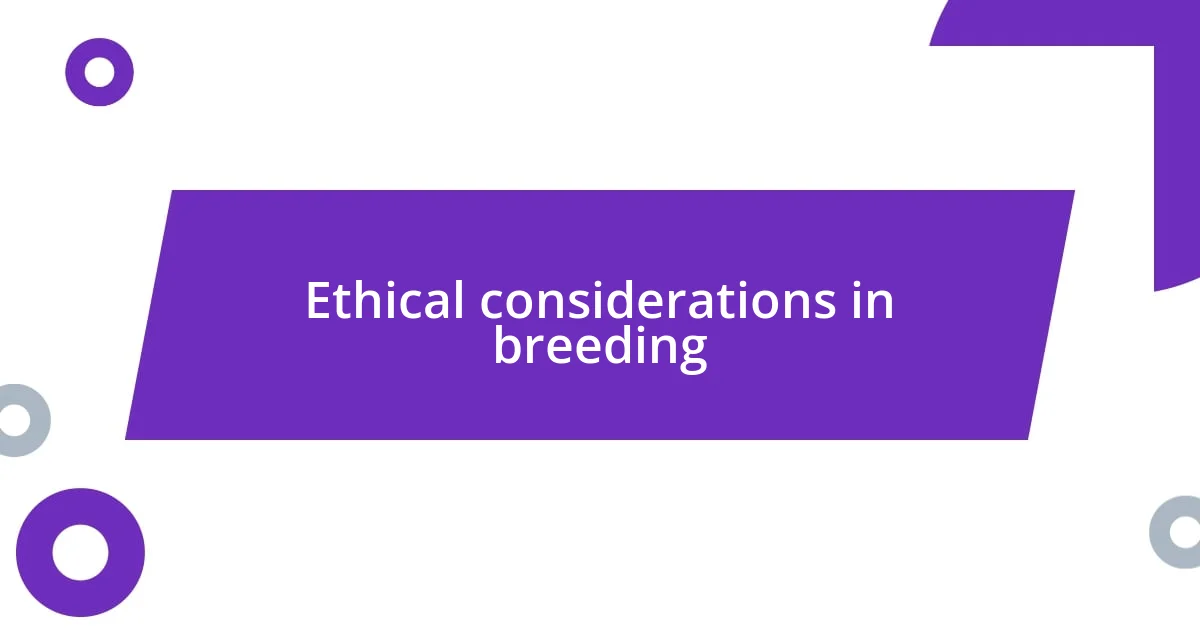
Ethical considerations in breeding
Ethical breeding goes beyond legality; it encompasses a deep sense of responsibility toward the animals and future pet owners. I recall a moment when a breeder friend of mine chose to delay a planned litter after discovering a potential health issue in the dam. That choice, while tough, reflected her commitment to ethical standards and prioritizing the welfare of the puppies. Isn’t it inspiring when breeders put the well-being of their animals above their ambitions?
I often think about the heartbreaking stories that emerge from unethical breeding practices. I’ve met families who fell in love with puppies only to face devastating health crises because the breeder didn’t prioritize ethical considerations. It makes me wonder: how can anyone justify breeding without consciously addressing the potential risks involved? The truth is, breeding should never be merely a transaction; it’s a partnership between humans and animals that demands transparency and compassion.
Moreover, ethical considerations extend to the homes puppies are placed in. Responsible breeders take time to ensure that prospective owners understand their role in the pet’s life, emphasizing the long-term commitment involved. For instance, I’ve seen breeders host educational sessions to inform new owners about training and health care. This kind of involvement shows that ethical breeding means nurturing not just the puppies but the relationships that they will form with their families. This holistic viewpoint is what I deeply value in responsible breeding.
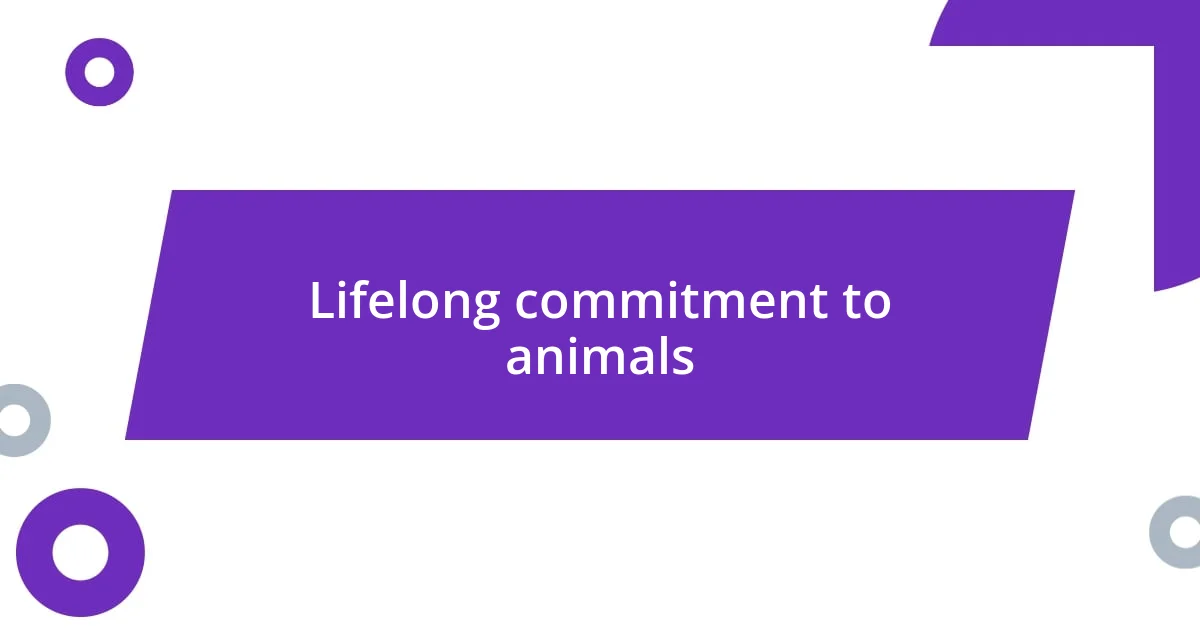
Lifelong commitment to animals
Understanding what it means to have a lifelong commitment to animals has shaped my views on responsible breeding profoundly. I remember my first dog, an energetic Golden Retriever named Max, who lived a full 12 years. The memories of our adventures together still warm my heart. It was during those years that I realized the depth of the bond formed through unconditional love and care. This connection isn’t just temporary; it’s a lifetime promise to provide support, companionship, and protection.
Whenever I see breeders enthusiastic about finding forever homes for their puppies, I can’t help but appreciate the gravity of their responsibility. The puppies aren’t just products to sell; they represent a commitment that will span the owners’ lives. I often think about my friend who adopted a rescue cat. Her decision to take in an older cat, despite knowing she might have a shorter lifespan, showed how love transcends time. Isn’t it wonderful to consider that breeders can help create similar long-term bonds?
I truly believe that a responsible breeder acknowledges that their role continues well beyond the sale. They become advocates who support puppy owners, offering guidance and resources for the entirety of the pet’s life. From training tips to health inquiries, I’ve seen breeders who check in on their litters long after they’ve gone home. This ongoing support can make all the difference for new pet owners, helping them navigate the ups and downs of pet ownership. Don’t you think that this kind of dedication fosters a healthier, more informed community of pet owners? It’s this commitment that elevates responsible breeding to a level of genuine care and concern for the animals and their future homes.
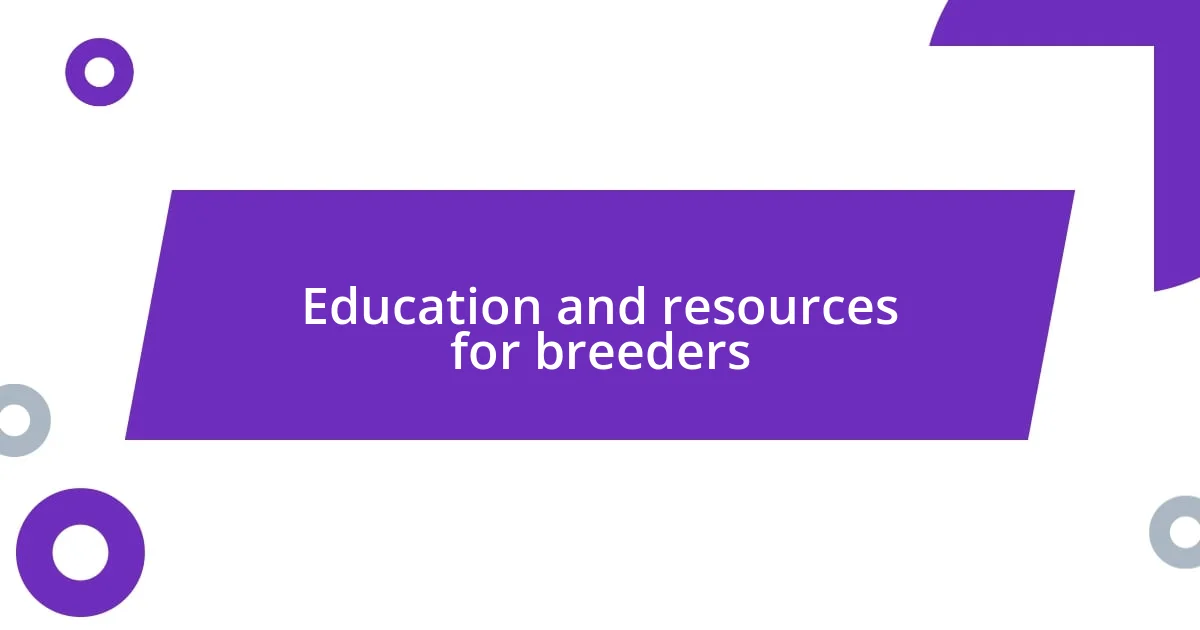
Education and resources for breeders
Education and resources play a crucial role in developing responsible breeders. I’ve seen firsthand how attending workshops not only sharpens their skills but also ignites passion for ethical breeding. I remember a seminar where a seasoned breeder shared her experiences—her mistakes and triumphs alike—creating a sense of community among us. How valuable is it to learn from the lived experiences of those who’ve walked the path before us?
Moreover, access to up-to-date scientific resources can be a game-changer. I often reflect on how beneficial it was for me to dive into reputable veterinary articles and behavioral studies as a new pet owner. This knowledge helped me make informed choices that ultimately benefited my dog’s training and health. Imagine how much easier it would be for breeders to ensure the well-being of their pups if they could draw from a wealth of current information!
Finally, I believe mentorship can be an invaluable resource. When I was starting out, having a mentor who shared their wisdom made all the difference. I still remember the late-night phone calls seeking advice during moments of doubt. A supportive network encourages breeders to ask questions without fear, nurturing a culture of continuous learning. Isn’t it inspiring to think that a well-educated breeder can positively impact not just the puppies, but also the pet community at large?
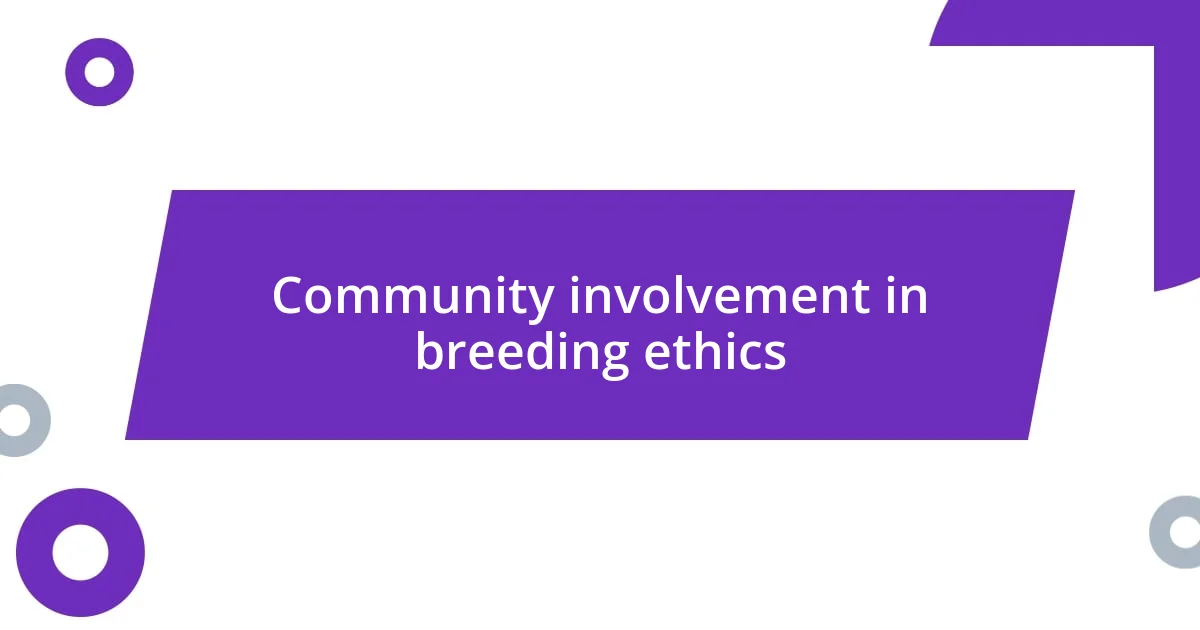
Community involvement in breeding ethics

Community involvement in breeding ethics
Being part of a community dedicated to breeding ethics can be incredibly fulfilling. I recall attending a local animal welfare event where breeders, rescue groups, and veterinary professionals gathered to discuss best practices. It was enlightening to see how open discussions about challenges foster a sense of accountability among breeders. Isn’t it refreshing when everyone involved in the breeding process collaborates for the well-being of animals and future pet owners?
Moreover, community involvement can significantly raise awareness about responsible breeding practices. I once volunteered for a breed-specific rescue group, where we hosted educational workshops for prospective pet owners. Watching the transformation in people’s understanding about the importance of health testing and ethical practices was heartwarming. This kind of engagement not only empowers experienced breeders but also creates informed pet owners who prioritize the welfare of their pets. Have you ever witnessed such a shift in perspective?
To me, it’s not just about breeding; it’s about building a network that values transparency and ethical practices. I’ve seen breeders who actively join forces with local shelters and other advocacy groups, creating programs that ensure better homes for their litters. The stories of dogs finding loving homes thanks to these initiatives tug at my heartstrings. Isn’t it remarkable how community involvement can amplify the positive effects of responsible breeding, leading to happier lives for both pets and their families?













